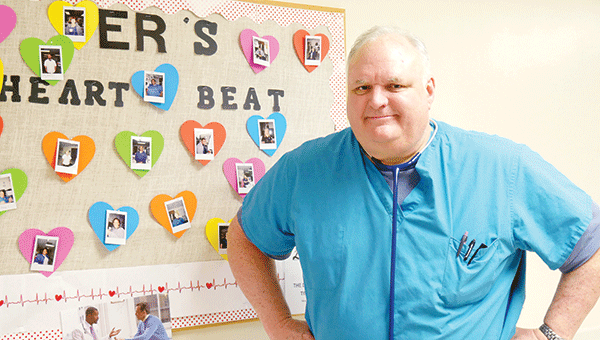McGowin opens new chapter in medical career
Published 1:46 pm Thursday, July 19, 2018
|
Getting your Trinity Audio player ready...
|
He’s been a fixture within the local medical community for almost three-and-a-half decades. Now this Butler County native is ready to move into a new chapter in his life.
Dr. Norman McGowin is officially closing his general surgery practice at the Medical Arts Building on the L.V. Stabler Memorial Hospital campus this August. The longtime Camellia City surgeon will be fully shifting his focus to serving patients in the hospital’s ER rather than in a private practice office or the operating room.
Since December 2017, McGowin has been pulling regular shifts at the local emergency room on the weekends as well as continuing to receive patients at his office throughout the week.
“I find the ER work very fulfilling – I enjoy it,” he said. “And now it’s time to make some changes.”
Looking back, the doctor has invested a large portion of his life and life-long passion for medicine in serving the citizens of Butler County.
“I came back to Greenville to practice medicine in 1985, and worked at Stabler Clinic until 1993,” McGowin explained. “I opened my office in January 1994, and when it closes next month, that will be 24 years . . . altogether, I guess that makes 33 of my 38 years as a doctor spent here in Greenville.”
McGowin grew up in the south Butler County community of Chapman where he attended elementary school before moving on to what was then Greenville Junior High for seventh and eighth grades.
Math and science were McGowin’s favorite subjects, he says. The popular television dramas of the ’60s and ’70s revolving around hospitals and the dedicated doctors on their staffs – especially surgeons like the eponymous hero “Dr. Kildare” and Dr. Joe Gannon of “Medical Center” – became “must-sees” for the young teenager. He was definitely drawn to the world of medicine.
“I guess you could also say I had a slightly morbid curiosity,” he admits with a chuckle. “Every time I heard an ambulance going by, I wanted to know what was going on inside it.”
The veteran physician says he knew from his high school days as a student at a New Jersey boarding school that he wanted to become a surgeon – even if it was a profession quite different from the rest of his kith and kin. The McGowin name had, after all, been synonymous with the lumber industry in Butler County for generations.
“I am actually the first one in my family to become a doctor,” he said. “Everyone else was involved in lumber. I do remember my father, who was running Rocky Creek Logging Company back in those days, encouraging me to go into either law or medicine. I’d say it was good advice.”
After high school, McGowin went on to Duke University to obtain his undergraduate degree in zoology.
“I went north – and then I kept heading back south,” he recalls with a chuckle. “Up to New Jersey, then down to Durham, N.C., and then to UAB in Birmingham for medical school and residency, and finally, back here.”
While he could perhaps have had a more lucrative career in a more urban locale, McGowin says he never really considered practicing anywhere except Butler County. It’s about roots – and family ties.
“We have a large and a close extended family in the Butler County area,” McGowin said. “This is where our family’s old homestead is located. Even though some of the family members now live elsewhere, they still have places down here, too.”
It would be another Butler County family, the Stablers, who provided inspiration and mentorship for McGowin as an aspiring medical student and later, as a young physician.
“The old Stabler hospital was over close to the current clinic, and I remember getting to see all facets of how the hospital ran and I really enjoyed it,” he said. “Both Dr. Vernon Sr. and Dr. Vernon Jr. were surgeons, and I found this so interesting and cool. Not every kid knows exactly what he wants to do in his teens or even when he goes away to college, but I really did.”
As a general surgeon – and often, the only surgeon – in a largely rural county, McGowin found himself learning how to handle a variety of cases, from removing problematic gallbladders to repairing limbs severely injured in a farming accident. He often worked long hours in order to keep up with all those cases – and vacations were more the exception than the rule.
When time allowed him to get away from the clinic, the office, the hospital, the doctor would often, quite literally, take flight.
“My dad was an aviator and he loved planes,” McGowin said. “He had his own landing strip, too. I was also drawn to that. I started taking flight lessons as a teenager and got my pilot’s license, even owned my own plane for a while. It’s a very expensive hobby and one that takes a real commitment of time and resources to do safely. Even though I am not flying now, aviation is still one of my major interests. I’d love to get back into it someday.”
The stresses and strains of a busy surgeon’s life could be left behind, he says, as the plane gained altitude “and left all my earthly worries behind.”
Flying also allowed him to hone the abilities he had worked to perfect as a surgeon – mental discipline, physical skill and good judgement.
All those qualities were, and are, important for him to be able to do his job – along with being surrounded by the right people, McGowin says.
“I have to say I have been truly fortunate here in Greenville throughout my career to have a really strong core of professionals around me,” the veteran surgeon recalls. “As a young doctor, I worked with Dr. Vernon Jr., who was 20 years my senior, and what a great mentor he was. Really showed me the ropes. I would be remiss as well to not point out all the help and camaraderie that I’ve gotten from Dr. Hood and Dr. Patel over the years as well.”
“Later on, after I opened my own office, I always had a great team of people in place, really good nurses and support personnel, not only in my office, but also in the hospital and the O.R.,” McGowin said. “I look on all these folks as part of my extended family.”
But now, McGowin, says, it is time to make a change.
The increasing challenges of meeting the mandates of insurance companies and Medicare, the complications created by Obamacare, masses of bureaucratic red tape, the potential threats to required electronic health records by hackers and the ever-increasing costs of overhead for operating a medical office: all these have played a factor in the doctor’s decision to close his practice.
“As a doctor, you worry about your patients – it’s almost too much to have all the rest to worry about, too,” McGowin said. “Now, I can work in an acute care setting, take care of patients and either send them home or refer them on to another physician. Working here provides me with the variety of cases and the excitement of practicing medicine that I love – but at the end of my shift, I can also go home and leave it behind in a way I couldn’t do in my surgery practice. I am still keeping my hand in, but in a way that’s ultimately a lot less stressful. There are always going to be headaches, of course, in anything you do. But after these past six months working in the ER, I do feel like it’s the right thing to do.”
While 12- and 24-hour shifts in the ER are no walk in the park, the doctor will have more time off to not only catch up on his shuteye, but to weigh other options for the future. He likes knowing he is still offering valuable medical experience to those in need of it here at home.
“I do count myself fortunate to be working with great medical professionals here at our hospital, not only in the ER, but also the hospital as a whole,” McGowin concluded. “We really do have a strong core of not only doctors, but also nurses, technicians, and all the other support people that keep the place running. I think all small community hospitals are going through struggles right now, but I know they are also vital to communities like ours. If you are having severe chest pains or are struggling to take a breath, well – it’s a long way to Montgomery! Having a local ER can make a world of difference.”






